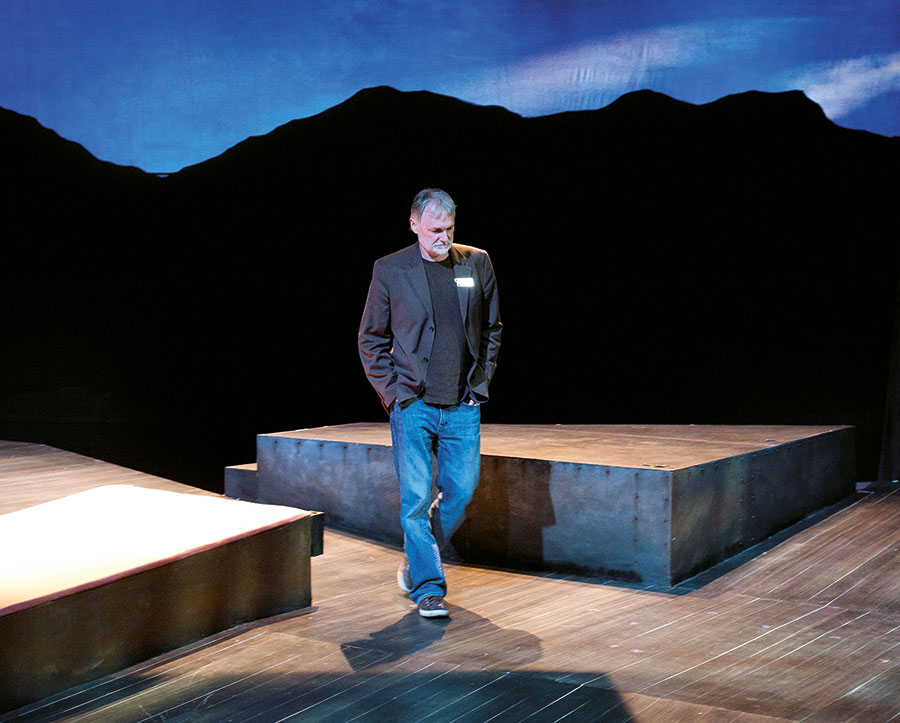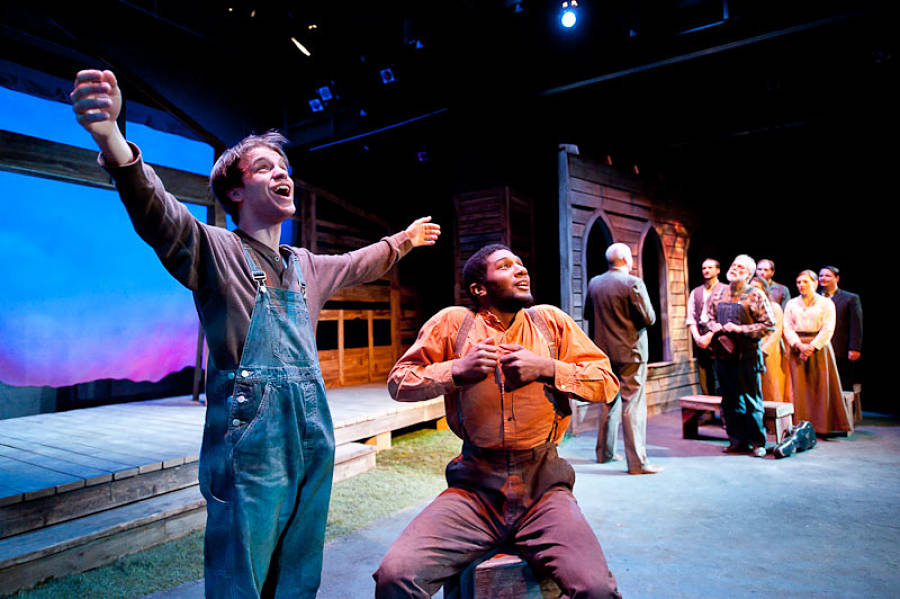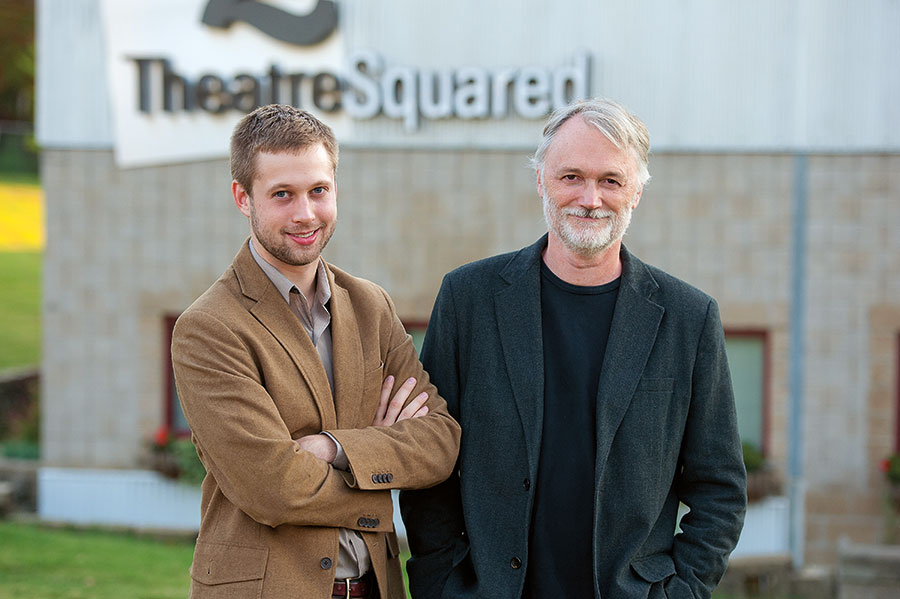“If you’re not from this area, you probably make certain assumptions about where you’re going,” says TheatreSquared executive director Martin Miller, who is most definitely from around these parts. “That was to my advantage in taking this job, knowing that it’s actually this great, arts-supportive community that’s growing and has all this potential, whereas other people would just say”—and here Miller cocks his head and adopts a rising inflection in his voice—“Arkansas?”
Miller and Robert Ford, TheatreSquared’s artistic director, are sitting with me on a sunny, muggy afternoon last July on the shaded porch of a café in Fayetteville, Ark. The café is carved out of a former freight building behind the decommissioned depot for passenger trains on Dickson Street, long the central entertainment hub of Fayetteville, as it connected the old town square to the sprawling campus of the University of Arkansas.
Though you’ll no longer hear “All aboard!” here, the rail lines are still in use. Twice during our long conversation, we pause to let a train roll by, blasting its horn. The first time, as the train approaches, Ford hollers: “The most important thing you need to know is…” and both men silently mouth words at me while my recorder picks up nothing but the rumbling locomotive. “Hope you got all that,” Ford jokes once we can hear each other again.
The opportunity to sip iced lattes and nibble peach crepes in the shadow of an active railroad is a new development since I moved away from Fayetteville 15 years ago, following my time as a theatre major at the university. But now I can add it to my list of my hometown’s unique charms. Miller, like me, grew up in Fayetteville, and he shares my deep affection for the quirky hybrid character that results from the collision of artsy aging hippies and Bible Belt Baptists in a college town.
Nestled in the rolling Ozark Mountains in Arkansas’s northwest corner, near the borders of Oklahoma and Missouri, Fayetteville’s population cracked 80,000 in 2014, according to U.S. Census Bureau estimates. The string of neighboring cities along Interstate 49 in Northwest Arkansas—Fayetteville, Springdale, Rogers, and Bentonville—are the state’s four fastest growing, with Fayetteville looking to overtake Fort Smith, an hour south, as Arkansas’s second-largest behind the capital, Little Rock.
“We have people moving in from other areas of the country, and other countries for that matter, where they had access to more theatre,” says Lynn Donald Carver, a longtime supporter of the arts in Northwest Arkansas and current president of TheatreSquared’s board. Indeed, until TheatreSquared opened in 2006, those new residents had no professional theatre in the area. For 30 years, Little Rock’s LORT company, Arkansas Repertory Theatre (commonly referred to simply as the Rep), was the only year-round Equity theatre in the entire state.
But Little Rock is a three-hour drive—and for much of it a fairly treacherous one—from Fayetteville. I grew up seeing occasional community theatre musicals and, once the Walton Arts Center was completed in the early ’90s, touring Broadway shows. You might have caught Shakespeare in a student production on campus. But an Equity company producing contemporary plays in the area was a novelty here when TheatreSquared bowed nine years ago with a staging of Theresa Rebeck’s Bad Dates.
“I have known of Bob for several years, and I remember when TheatreSquared launched, I was so excited to see someone take that leap in a very brave, genuine, fierce way in Northwest Arkansas,” raves Rick Dildine, artistic and executive director of Shakespeare Festival St. Louis, himself an Arkansas native.

For his part, Ford is a New jersey native; his route to Fayetteville was serendipitous but circuitous. Starting out as a classical musician, he “got bit by the acting bug” in his mid-20s and went to Rutgers University for what would be his first MFA. He began writing after working with the Waterfront Ensemble, a new-play development group in Hoboken, N.J., and later wrote a novel, The Student Conductor, that was published by Putnam in 2003. (“He’s something of a Renaissance man when it comes to the arts,” says Carver admiringly.)
His first trip to Fayetteville was as a playwright in 1994 as part of the acting company for the Mt. Sequoyah New Play Retreat, a three-week playwrights’ retreat at the top of the city’s tallest mountain. Affiliated with the University of Arkansas’s theatre department, the retreat provided playwrights with a pool of professional and student actors to workshop new material. (Mt. Sequoyah is where I met Ford in 1996, when I was cast in the acting company the summer after my freshman year.)
Mt. Sequoyah “kind of changed my life completely because of two people I met,” Ford tells me. One was David Mark Cohen, playwriting professor at the University of Texas at Austin; his influence led Ford to another MFA, at UT’s Michener Center for Writers. And the other—well, as Ford puts it matter-of-factly, “And then I fell in love.” Amy Herzberg, the head of performance at the University of Arkansas, portrayed the lead in Ford’s play at the retreat, and her presence, says Ford with a chuckle, “put Fayetteville on the map for me in a huge way.” After getting another MFA in Texas, he moved to Fayetteville to be with Herzberg.
It was Herzberg, Ford recalls, who first suggested that a professional company could be viable in the area. “She said, ‘Someone’s going to come along and do this at some point. There’s an audience here. There’s this real love for the arts here.’ I logged that in the back of my mind.”
Then, around 2004, the idea resurfaced.
“A very good friend of ours, a local architect named Bob Kohler, and his wife, Laura Goodwin, invited us over for dinner,” Ford says. It wasn’t a casual meal, he learned when the couple cleared away the dishes and asked Ford and Herzberg, point blank: “So what do you guys need to start a professional regional theatre in Fayetteville?”
Ford and Herzberg decided to join forces with another couple they’d met, Kassie Misiewicz and Dan Hintz, who had recently moved from Seattle with designs on starting a professional theatre for young audiences. Along with colleagues Morgan Hicks and David Pickens, TheatreSquared was born, though it would be a few years more before the curtain went up.
“A crucial decision was made early on to produce the first play at the level that we projected ourselves as being,” Ford says. In other words: Significant funds would need to be raised to make the company sustainable before a show could go on. The wait paid off, Ford thinks, because for “the community—the cultural, academic, philanthropic community,” their “first taste of TheatreSquared was a very fine production.”
That Ford’s novel had come out not long before discussions about TheatreSquared began proved fortuitous for fundraising efforts.
“I had gradually started to meet many of the kinds of people in Fayetteville who would also support a theatre, from a fundraising standpoint, because I published the novel while I was here and had some local notoriety as a result,” he says. “You meet some key people, which we’ve discovered is everything when you’re starting something new. It’s about relationships and trust.”
Another area where the fledgling company wanted to foster relationships and trust was with actors. TheatreSquared worked under Equity contracts from the start, beginning with Fayetteville native Rebecca Harris, who starred in Bad Dates. “We were immediately identifying ourselves as that kind of theatre, for those who cared,” Ford notes. But Pickens, an Equity actor himself, wanted to go a step further.
“He’s a real kind of union guy,” says Ford. “He was like, ‘If you’re acting in the show next to another person, everyone should be getting the same amount of money, whether they’re Equity or non-Equity,’” Ford says. The company has stuck to that principle. “It’s a job,” Ford says. “There was a strong feeling of, if we’re going to pull somebody away from their home in Chicago or New York or wherever, or even locally, that is something that is a tell for who we are and how serious we are.”
Alternating adult shows with youth theatre proved to be a marketing hurdle; Hintz and Misiewicz, who initially held the title of artistic director, peeled off after a year and a half and founded the TYA-only Trike Theatre, a few miles north in Bentonville. Meanwhile, TheatreSquared began to find its identity.
“At that time [of the split] it made sense to us internally that I would take on the role of artistic director,” Ford says, “which was interesting, because I was a playwright and not really a director.” His role as a working writer shaped the company’s aesthetic. “The plays that are being written now are addressing, presumably, the zeitgeist,” he says. “What’s interacting with where our society is now? We quite consciously decided not to be a traditional rep company.”
Instead, TheatreSquared leaned toward works like Michael Healey’s The Drawer Boy, David Lindsay-Abaire’s Rabbit Hole, Rebeck’s Mauritius—plays that may sound like standard resident-theatre fare, but not for the average Arkansan. “They’re not going to get to see, you know, [Stephen Karam’s] Sons of the Prophet, and we aren’t either, necessarily,” Ford says. “So very early on, part of the mission was, let’s bring ‘Off-Broadway’ [here].”

TheatreSquared also has a local new-work mission: In 2009, a grant opportunity from the Department of Arkansas Heritage led to the inaugural Arkansas New Play Festival. “We’d commission four new plays that had something to do with Arkansas,” Ford explains. “Maybe the playwright was from Arkansas, maybe it was something biographical, historical.”
One of that first festival’s biggest successes was Sundown Town, a historical drama by Fayetteville writer Kevin D. Cohea that centered on the practice in the early 20th century of white towns outlawing “strangers”—i.e., African Americans—within city limits after dark. “This is any north Arkansas town back in the 1910s, except for Fayetteville,” Ford notes. Cohea’s play, which included found music of the era performed live, was “a watershed moment. People just went crazy for that show.”
Ford says that while his audience has broad tastes, which stem from their disparate origins (“A lot of people move here from Chicago or Minneapolis, or up from New Orleans”), they seemed hungry for a show “about our region. They wanted to come to grips with that—with what’s in the soil here.” Sundown Town got a full production in the 2010–11 season.
Miller, who’d known Ford since being directed by him as a teen at the young actors company Arts Live, kept in touch and paid attention to what TheatreSquared was doing while he spent three years in Chicago, earning his Master’s in arts leadership at the Theatre School at DePaul University, a program which also entails working in productions at Chicago Shakespeare Theater. In 2009, he returned to Fayetteville to join Ford at TheatreSquared’s helm.
“They are so driven by the work they have to do; it’s so satisfying to them,” board president Carver says of the pair. “Clearly they’re having a wonderful time. Every time they introduce a play together you can just see the rapport, the chemistry between them.”
The company, which had already made a fast impression on the region, soon began a period of stratospheric growth. Since Miller’s arrival, TheatreSquared’s budget has ballooned from $160,000 to $1.6 million. The number of patrons attending a TheatreSquared performance in a season, Miller says, has gone from 3,000 to 32,000 in the same period.
In 2011, five years into its life, the company was recognized by the American Theatre Wing with a National Theatre Company Grant. That same year, TheatreSquared received a three-year $275,000 grant from the Walton Family Foundation, which puts much of its funding into enhancing cultural life in Northwest Arkansas. “They want us to be a region where you don’t have to get on a plane to do X,” as Miller says. In 2014, the foundation came back with another three-year grant, this time in the low seven figures.
With this level of growth, TheatreSquared has hit the physical limits of the multipurpose space in a Walton Arts Center annex building it’s rented for performances since its birth. Having its scene shop three miles away in an industrial area of the city has begun to seem too impractical, as does putting up visiting artists to stay in the homes of supporters.
And so, in August 2015, at the beginning of its 10th season, TheatreSquared and the city of Fayetteville announced they’d be using a National Endowment for the Arts Our Town grant to explore possible sites for a new permanent home. In October, the city council unanimously approved giving over a city-owned parking lot in a prime downtown location. Then, in November, at TheatreSquared’s annual gala, it was announced that London-based theatre designers Charcoalblue and Jonathan Marvel of New York City’s Marvel Architects would collaborate on the $25 million facility, expected to open in 2019 with a 150-seat black box and 280-seat mainstage, onsite scene shop, administrative offices, rehearsal space, and actor housing. Financial support for the design will come from the Walton Family Foundation’s Northwest Arkansas Design Excellence Program.
At the gala, Charcoalblue’s John Owens referred to another Walton-related project that’s drawn major attention to Northwest Arkansas: Crystal Bridges Museum of American Art, a pet project of Walmart heiress Alice Walton that opened in Bentonville in 2011, putting her own expansive collection on display in a stunningly designed Moshe Safdie building—or, as many early reports put it, in the “middle of nowhere.”
As a native son, reading those dismissive descriptions stuck in my craw. Miller felt the same. “New York Times, Wall Street Journal, Washington Post—every single one of them starts, ‘In the middle of nowhere in rural Arkansas’! It was driving me nuts!” he rants. “You know it’s because they’re coming in, and they want to have that angle. They don’t want to look around; they don’t want to see that there’s a lot going on. They’ve anticipated their readers’ expectation, and they want to open the article by meeting that expectation. ‘There’s dusty roads out that way, and there’s a chicken shack, and you wonder: Will this art ever be seen?’”
Miller smiles broadly as Ford gently chuckles beside him. “It’s hilarious, and it’s the opposite of what this region is and aspires to be,” Miller concludes. “And so, yeah—as another cultural institution in the area and among some others, we would like to make it so that you can’t start an article that way.”
Kris Vire is a theatre critic and senior editor at Time Out Chicago.


